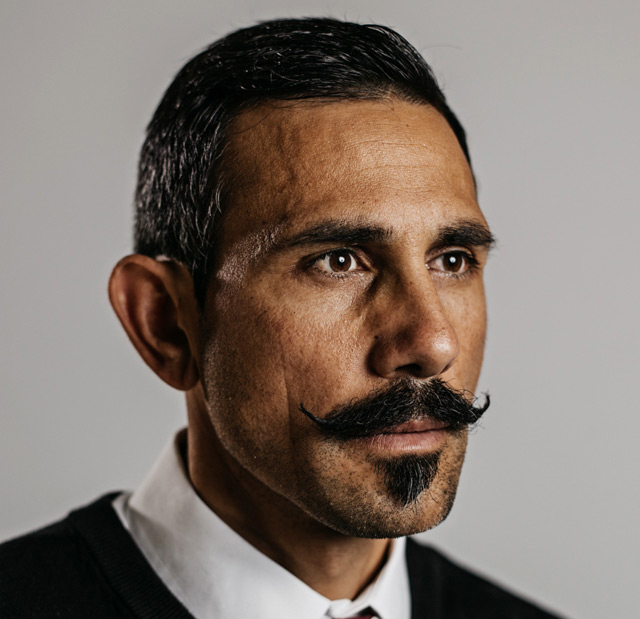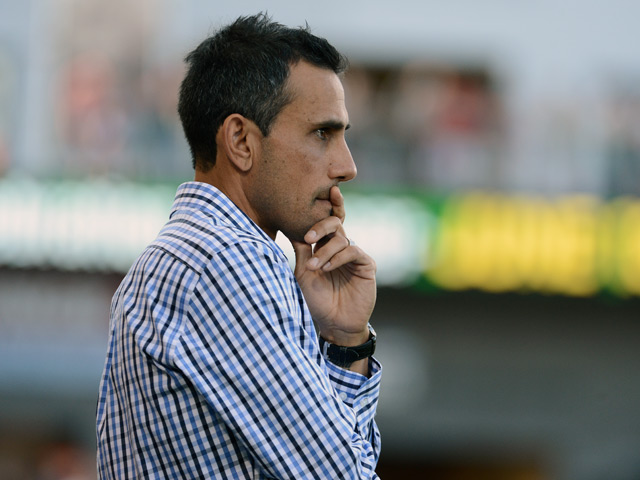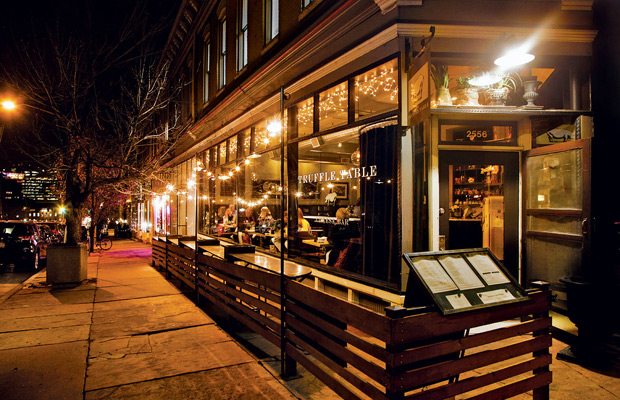In 2014, local soccer legend Pablo Mastroeni returned to the Colorado Rapids to take over as coach and immediately led the team to one of its worst records ever. Now he has a plan that might just save the squad—if he and his players can only wrap their minds around it.
By Natasha Gardner
Photography by Benjamin Rasmussen
March 2015
For once, it’s not windy. Dick’s Sporting Goods Park in Commerce City is usually buffeted by gusts that race from the foothills toward the Eastern Plains, but on October 18, 2014, the flags at the seven-year-old soccer stadium hang limp. A teenager screeches out an awkward version of the national anthem on an electric guitar as the sparse crowd awaits the Colorado Rapids’ last home game of the year. The meager attendance is probably good; it means fewer people will notice that the kids hauling the oversized state flag off the field are dragging it along the ground.
The Rapids are set to face FC Dallas, an MLS rival coached by Óscar Pareja. Pareja was Colorado’s coach less than a year ago, but in a soap-operatic move, he absconded to Dallas, where he’d previously played and served as an assistant coach, just before the preseason. To say the defection created angst—from the players, the management, and the fans—would be an understatement. It doesn’t help that as they warm up for this contest, the Rapids are mired in a 14-match winless streak in a regular season that only comprises 34 games. The team is still struggling to settle into a starting 11 lineup (it will employ at least 30 variations by the end of the season). If there is an opposite of mojo, rhythm, and synergy, the 2014 Colorado Rapids embody it.
After the starters are introduced, a cannon booms, but the lack of wind leaves the smoke hovering over the field. Faintly visible through the haze is the person at the center of this dismal season: Pablo Mastroeni. After Pareja’s departure and the hasty vetting of a slim roster of candidates, Rapids president Tim Hinchey announced Mastroeni’s arrival as head coach—on the same day the MLS regular season started and barely a week before the Rapids’ first match.
He was a logical choice, if not an obvious one. Most MLS coaches have played in the league, and Mastroeni spent much of his career as a beloved Colorado midfielder, celebrated by fans for his forceful tackles. (He holds the league’s all-time record for yellow cards.) Having also played on the U.S. men’s national team for 65 matches, including two World Cup runs, Mastroeni is the Rapids’ version of soccer royalty. Conveniently for Hinchey and the organization, he’d just retired, hadn’t sold his Broomfield home, and was looking to get into coaching.
The trouble was, Mastroeni wasn’t a coach; he’d never even been an assistant. The sum total of his soccer teaching experience was a few course hours in college. Now, with literally no time cushion, he was charged with turning the wisdom he’d gleaned from his field time—more than 27,000 minutes in his professional career—into a strategic philosophy he’d have to impart to a roster of millennials. No one doubted he could learn; Mastroeni’s mental focus has always been unwavering. But how long would it take for him to command the knowledge and respect any coach must have? And would Kroenke Sports Enterprises (KSE), which also owns the Denver Nuggets and Colorado Avalanche and is the largest shareholder in the Arsenal franchise in the English Premier League, have the patience to let him find his style? “He overthinks things,” says Chris Bianchi, who covered the Rapids from 2012 to 2014 for mlssoccer.com before being fired. (In the days leading up to his ouster, Bianchi’s criticism of the team’s front office had drawn the ire of Hinchey and others.) “Does [a team] loving a coach translate to wins? It probably helps, but it’s not a surefire deal. Pablo has to figure things out.”
Now, as the cannon smoke clears, the five-foot-10-inch Mastroeni, still trim and fit, stands motionless in the coach’s box on the sideline. Wearing a burgundy cardigan and a dress shirt with a wide-stripe tie, he has his hands shoved into the pockets of his tan slacks, as if he’s forcing himself not to move. His tense jaw emphasizes the muscles in his neck; it looks as though he’s torn between wanting to jump across that line to play again and trying to figure out, as a coach, what the hell can be done. Overhead, a plane circles the field, hauling a sign that reads, “YOU HAVE WRECKED OUR CLUB KSE AND HINCHEY OUT.” The diehards in the crowd chuckle or holler in agreement—and then begin rumbling amongst themselves in what’s become a yearlong ritual: Was this lost season actually Mastroeni’s fault? Or is he the Rapids’ best chance to recover?









